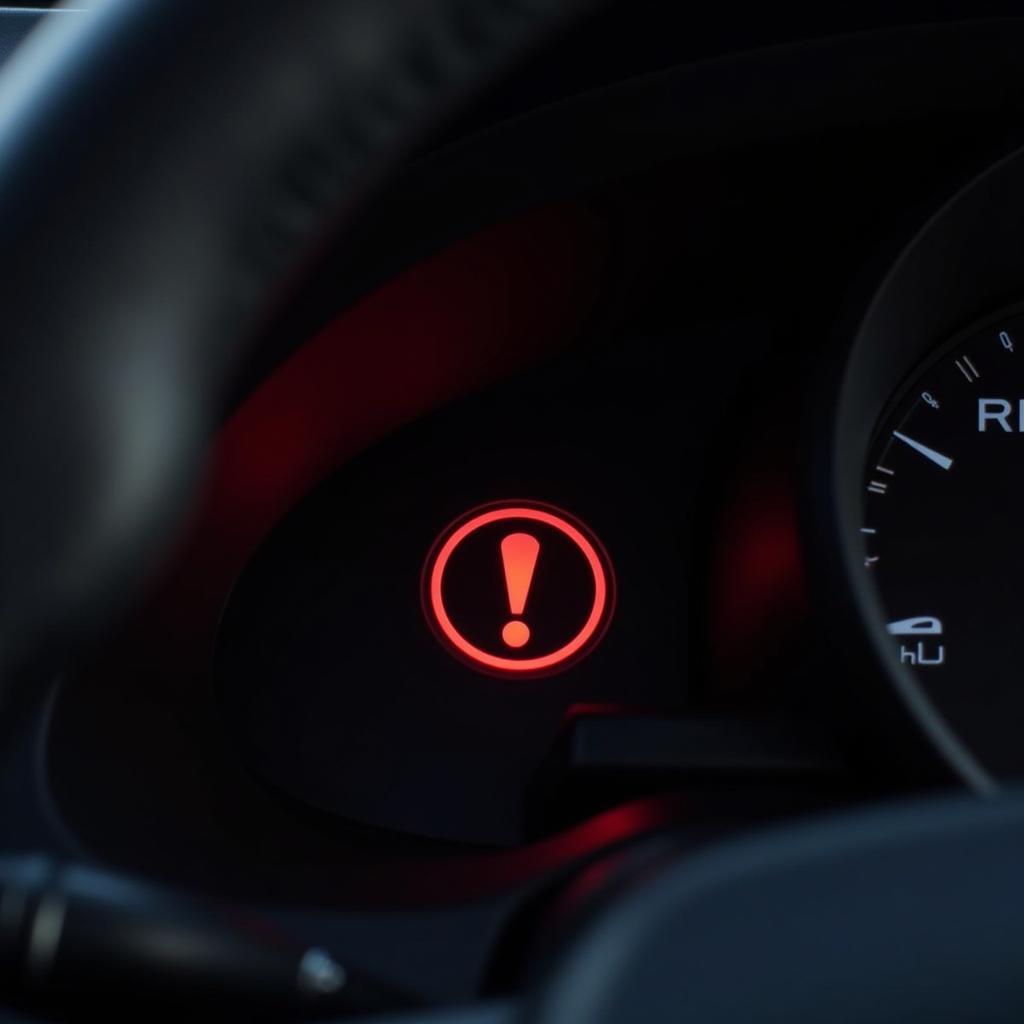The “brake system warning light” on your Toyota Prius dashboard is a jarring sight for any driver. This bright red indicator signifies a potential issue with your car’s critical braking components, demanding your immediate attention. While it might trigger anxiety, understanding the possible causes and knowing how to address them can save you from costly repairs and keep you safe on the road.
Decoding the Brake System Warning Light
The brake system warning light in your Toyota Prius is designed to alert you to a range of issues, from the simple to the complex. Unlike other warning lights that indicate a specific system malfunction, the brake warning light covers a broader spectrum of potential problems.
Here’s a breakdown of what could cause the brake system warning light to illuminate:
-
Low Brake Fluid: This is the most common culprit. Brake fluid is the lifeblood of your car’s braking system, transmitting the force from your foot on the pedal to the wheels. A leak in the system or worn-out brake pads can lead to low fluid levels, compromising braking efficiency.
-
Engaged Parking Brake: It might seem obvious, but sometimes the simplest explanation is the right one. If you’ve left your parking brake even slightly engaged, the warning light might come on.
-
Faulty Brake Light Switch: Your brake lights play a crucial role in signaling your intentions to other drivers. A malfunctioning brake light switch can trigger the warning light as it also plays a part in detecting brake pedal application.
-
ABS Issue: Your Prius is equipped with an Anti-lock Braking System (ABS) designed to prevent wheel lockup during hard braking. A problem with the ABS, such as a faulty sensor, can trigger the warning light.
-
Serious Brake System Malfunction: In some cases, the warning light could indicate a severe issue with the braking system itself, such as a failing master cylinder or a problem with the brake lines.
 Toyota Prius Dashboard with Brake Warning Light Illuminated
Toyota Prius Dashboard with Brake Warning Light Illuminated
What to Do When the Light Turns On
Seeing the brake system warning light come on can be stressful, but it’s essential to remain calm and take immediate action. Remember, driving with a potential brake problem puts you and others at risk.
Follow these steps:
-
Safely Pull Over: As soon as it is safe to do so, pull over to the side of the road or a safe location. Avoid heavy traffic areas.
-
Check Your Parking Brake: Ensure your parking brake is fully released. If it was engaged, disengage it and see if the warning light turns off.
-
Inspect Brake Fluid Level: With the engine off, locate the brake fluid reservoir under the hood (consult your owner’s manual for its exact location). Check the fluid level, which is usually visible through a translucent reservoir. If the fluid is low, it needs to be topped up. However, if you find yourself adding brake fluid frequently, it indicates a leak that requires immediate professional attention.
 Checking the Brake Fluid Level in a Toyota Prius
Checking the Brake Fluid Level in a Toyota Prius
- Contact a Mechanic: If the warning light remains illuminated despite checking the parking brake and brake fluid, it’s crucial to contact a qualified mechanic immediately. Driving with a potential brake system issue is extremely dangerous.
Don’t Delay, Get It Checked
Ignoring the brake system warning light in your Toyota Prius is a recipe for disaster. Even if your car seems to be braking fine, there could be an underlying problem that could lead to sudden brake failure.
2005 prius brake warning light on can be a symptom of a minor issue or a major malfunction. By addressing the warning promptly, you can avoid potentially dangerous situations and costly repairs down the line.
Remote Diagnostics and Software Solutions
The automotive landscape is evolving, and with it, the way we diagnose and repair vehicles. Remote diagnostics and software solutions are becoming increasingly common, offering Toyota Prius owners a convenient and efficient way to address certain brake system issues.
Here’s how it works:
-
Connecting Your Vehicle: Using a specialized device that plugs into your Prius’s OBD-II port, your car’s data can be accessed remotely by certified technicians.
-
Diagnosing the Issue: These technicians can analyze your car’s system data to identify the root cause of the brake system warning light.
-
Software Updates and Fixes: In many cases, the problem can be resolved remotely through software updates or recalibrations. This eliminates the need for you to take your car to a physical location, saving you time and hassle.
-
Installation and Verification: Once the software fix is implemented, the technician can remotely verify if the issue has been resolved and the warning light is no longer illuminated.
prius vsc brake warning light can often be addressed using these advanced remote solutions. However, it’s important to note that not all brake system problems can be fixed remotely. Issues that require physical repairs or component replacements will still require a visit to a qualified mechanic.
Preventative Maintenance is Key
While some brake system issues are unavoidable, many can be prevented with regular maintenance.
-
Regular Brake Inspections: Have your brakes inspected by a qualified mechanic at least once a year or as recommended in your Prius’s owner’s manual.
-
Timely Brake Pad Replacement: Worn brake pads are a common cause of brake problems. Don’t ignore squealing or grinding noises when you apply the brakes.
-
Brake Fluid Flush: Over time, brake fluid can absorb moisture, reducing its effectiveness. It’s generally recommended to have your brake fluid flushed every 2 years or as per your owner’s manual.
Expert Insight
“Many Prius owners overlook the importance of regular brake inspections,” says John Smith, a senior automotive technician with over 20 years of experience. “They wait until they hear a noise or see the warning light before taking action. By then, the problem might have escalated, leading to more expensive repairs.”
Smith emphasizes the value of preventative maintenance, stating, “Investing in routine brake checks can significantly extend the life of your braking system and, more importantly, keep you safe on the road.”
Conclusion
The brake system warning light in your Toyota Prius is not a signal to panic but a call to action. By understanding the potential causes, knowing how to react, and embracing preventative maintenance, you can ensure your safety and keep your Prius running smoothly for miles to come. If the warning light does illuminate, don’t hesitate to seek professional help. Your safety is paramount.
